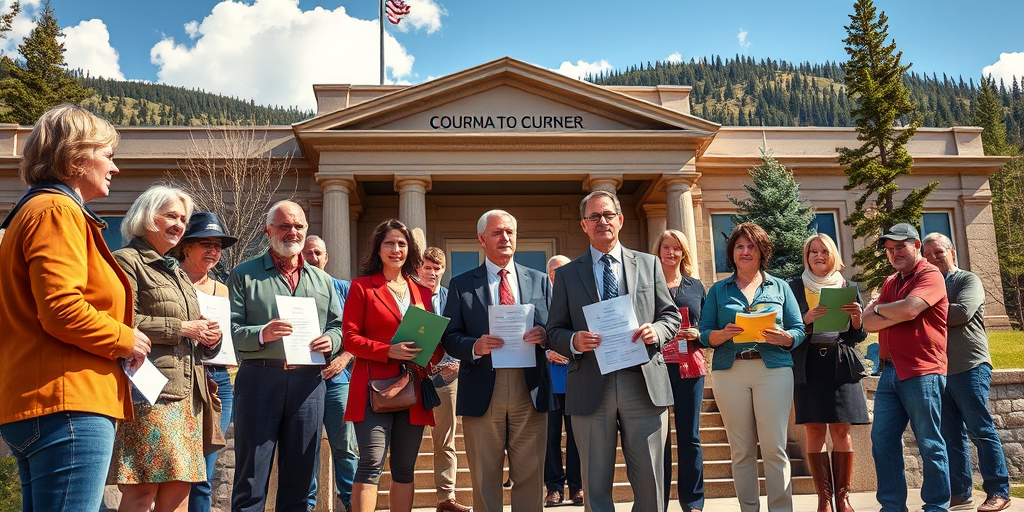Court Rules Federal Agencies Violated Environmental Laws in Montana Logging Project
In a significant victory for environmental conservationists and local community interests, a federal court has ruled that the U.S. Forest Service and the U.S. Fish and Wildlife Service violated key environmental laws in their approval process for the Knotty Pine logging project. Situated within the Kootenai National Forest of northwest Montana, a critical habitat for the endangered Cabinet-Yaak grizzly bear population, this project has been a focal point of legal and environmental scrutiny.
Decision Details
U.S. District Judge Dana L. Christensen made an impactful decision, highlighting the agencies’ failure to properly consider the detrimental effects of unauthorized motorized road use on the grizzly bears. These roads, often labeled “zombie roads,” remain a persistent threat as they frequently go unaccounted for in critical habitat assessments, yet are later repurposed for projects such as logging.
“This decision is a critical win for the Cabinet-Yaak’s struggling grizzly bears,” noted Kristine Akland, Northern Rockies Director at the Center for Biological Diversity. “For decades, federal agencies have turned a blind eye while roads carved up bear country, and grizzly bears have paid the price. The court’s ruling sends a clear message that the government can’t ignore facts or the law when it comes to protecting grizzlies.”
Impact on Local Environmental Efforts
The ruling imposes new requirements on the federal agencies to revise their assessments to comply with the Kootenai National Forest land management plan. This plan enforces strict controls on road density and mandates the consideration of illegal road use, effectively stalling the Knotty Pine Project. Originally slated to authorize extensive logging, burning, and road construction across more than 7,000 acres in the Yaak Valley, the project’s suspension is now celebrated as a pivotal win for the approximately 50 remaining grizzly bears in the region.
For local communities and environmental groups who have long fought against the degradation of natural habitats, this ruling represents a validation of ongoing advocacy efforts. “These projects on the Kootenai require significant capacity from our field crew, but we’re grateful that our citizen oversight was successful in protecting Yaak grizzlies and other components of a healthy ecosystem, utilizing the best available science,” remarked Rick Bass of the Yaak Valley Forest Council.
Legal Background and Community Engagement
The court’s decision follows a lawsuit filed in 2022 by conservation groups including the Center for Biological Diversity, WildEarth Guardians, and the Alliance for the Wild Rockies. Challenging the project’s environmental analyses, the lawsuit led to an interim halt of logging activities in early 2023, pending this recent ruling on the merits of the case.
Michael Garrity, Executive Director for the Alliance for the Wild Rockies, echoed the sentiments of many community members, “The Forest Service has tried to paper over the problem of illegal road use for decades. The court made clear that the agency can’t pretend those roads don’t exist, and that the science and the law both require real accountability for protecting grizzly bears.”
Wider Implications for the Community
The ruling not only impacts the future of grizzly bear populations but also serves as a powerful reminder of the critical need for federal agencies to account for all potential environmental consequences in their project assessments. For the communities in the Kootenai region, it underscores the intrinsic value of maintaining ecological balance and the potential tourism opportunities that come with preserving such a unique environment.
Local economist Dr. Sarah Langley commented on the broader economic implications, “The preservation of the Cabinet-Yaak region supports diverse economic activities, including wildlife tourism and recreational opportunities, which can provide sustainable income for local economies.”
Moving Forward
As the federal agencies reassess the Knotty Pine Project, local residents and conservationists alike are keenly focused on the process, emphasizing ongoing vigilance. This case sets a precedent on how similar environmental conflicts might be resolved in the future and could trigger more stringent checks on road density and habitat usage in federally managed lands.
Residents interested in further information or who wish to contribute to ongoing conservation efforts are encouraged to contact local advocacy organizations. For immediate concerns regarding the ruling or to participate in future community forums, contact details for involved organizations, such as Kristine Akland of the Center for Biological Diversity, are readily available.
In summary, the court’s decision is a milestone for those dedicated to environmental conservation in the region. It recognizes the importance of holding federal agencies accountable and serves as a catalyst for stronger conservation laws that protect vulnerable species and their habitats. This ruling also reflects broader U.S. environmental policy trends, signaling a shift towards more inclusive considerations of ecological and community impacts in land management plans.







